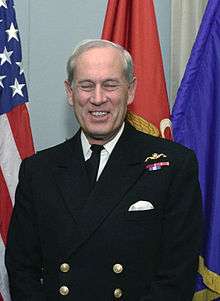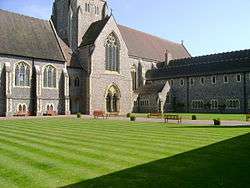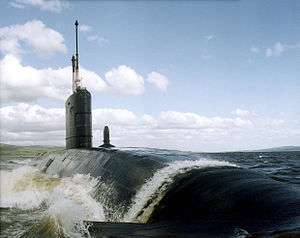Michael Boyce, Baron Boyce
| The Lord Boyce | |
|---|---|
 Boyce in 2002 | |
| Born |
2 April 1943 Cape Town, South Africa |
| Allegiance | United Kingdom |
| Service/branch | Royal Navy |
| Years of service | 1961–2003 |
| Rank | Admiral of the Fleet |
| Commands held |
Chief of the Defence Staff First Sea Lord Commander-in-Chief Fleet Naval Home Command HMS Brilliant HMS Superb HMS Opossum HMS Oberon |
| Battles/wars | Iraq War |
| Awards |
Knight of the Order of the Garter Knight Grand Cross of the Order of the Bath Officer of the Order of the British Empire Knight of Justice of the Order of Saint John Commander of the Legion of Merit (United States) |
| Other work | Lord Warden of the Cinque Ports (2004 – present) |
Admiral of the Fleet Michael Cecil Boyce, Baron Boyce, KG, GCB, OBE, DL (born 2 April 1943) is a former Royal Navy officer who now sits as a crossbench member of the House of Lords.
Boyce commanded three submarines and then a frigate before achieving higher command in the Navy and serving as First Sea Lord and Chief of the Naval Staff from 1998 to 2001 and then as Chief of the Defence Staff from 2001 to 2003. As Chief of Defence Staff he is believed to have had concerns about US plans for a national missile defence system. In early 2003 he advised the British Government on the deployment of troops for the invasion of Iraq, seeking assurances as to the legitimacy of the deployment before it was allowed to proceed.
Naval career

The son of Commander Hugh Boyce DSC and Madeline (née Manley), Boyce was educated at Hurstpierpoint College and the Royal Naval College, Dartmouth.[1] He joined the Royal Navy as a cadet in 1961 and, having trained as a submariner,[1] was confirmed in the rank of sub-lieutenant on 10 December 1965,[2] promoted to lieutenant on 30 August 1966[3] and saw service in the submarines HMS Anchorite, HMS Valiant and HMS Conqueror.[1] He completed the Submarine Command Course in 1973,[4] became commanding officer of the submarine HMS Oberon in the same year and, having been promoted to lieutenant-commander on 8 January 1974,[5] was given command of the submarine HMS Opossum later that year.[1]
Promoted to the rank of commander on 30 June 1976,[6] Boyce became commanding officer of the submarine HMS Superb in 1979.[1] He was posted to the Directorate of Naval Plans at the Ministry of Defence in 1981[4] and was appointed Officer of the Order of the British Empire in the 1982 Birthday Honours[7] before being promoted to captain on 30 June 1982.[8] He was given command of the frigate HMS Brilliant in January 1983, and returned to the Ministry of Defence as Captain, Submarine Sea Training in 1984.[1] He attended the Royal College of Defence Studies in 1988 and then became Senior Naval Officer in the Middle East in 1989.[1] He went on to be Director of Naval Staff Duties at the Ministry of Defence in August 1989. Following promotion to rear admiral he became Flag Officer Sea Training in July 1991.[1] He became Flag Officer, Surface Flotilla and NATO Commander of the Anti-Submarine Warfare Striking Force in November 1992.[1]
Promoted to vice admiral in February 1994,[4] Boyce was appointed a Knight Commander of the Order of the Bath in the 1995 New Year Honours.[9] He was promoted to full admiral on 25 May 1995, on appointment as Second Sea Lord and Commander-in-Chief Naval Home Command[4] and went on to be Commander-in-Chief Fleet as well as NATO Commander-in-Chief Eastern Atlantic and NATO Commander Allied Naval Forces North West Europe in September 1997.[1]

Boyce became First Sea Lord and Chief of Naval Staff in October 1998 and was advanced to Knight Grand Cross of the Order of the Bath in the 1999 Birthday Honours.[10] He was appointed Chief of the Defence Staff in February 2001[1] and in that role is believed to have had concerns about US plans for a national missile defence system.[4] In early 2003 he advised the British Government on the deployment of troops for the invasion of Iraq, seeking assurances as to the legitimacy of the deployment before it was allowed to proceed.[11] He was appointed a Knight of Justice of the Most Venerable Order of the Hospital of Saint John of Jerusalem on 27 November 2002,[12] and retired as Chief of Defence Staff on 7 November 2003.[13]
Later career
Boyce was created a Life Peer as Baron Boyce, of Pimlico in the City of Westminster, on 16 June 2003[14] and was appointed a Deputy Lieutenant of Greater London on 19 December 2003.[15] He was also appointed a non-executive director of WS Atkins plc in May 2004[16] and Lord Warden of the Cinque Ports on 10 December 2004, succeeding Queen Elizabeth the Queen Mother in that role.[17] He became chairman of the Royal Navy Club of 1765 & 1785 (United 1889) in 2004.[18]
In May 2005 Boyce was among the several retired Chiefs of Defence Staff who spoke in the House of Lords about the risk to servicemen facing liability for their actions – for which he claims politicians are ultimately responsible – before the International Criminal Court.[19] He gave evidence to The Iraq Inquiry on 3 December 2009.[20] He was created a Knight Companion of the Order of the Garter in April 2011[21] and is currently a member of the Top Level Group of UK Parliamentarians for Multilateral Nuclear Disarmament and Non-proliferation.[22]
Boyce is also Patron of the Submariners Association,[23] Dover College[24] and of the Dover War Memorial Project[25] as well as being an Elder Brother of Trinity House[1] and Chairman of the Royal National Lifeboat Institution.[26] He takes a keen interest in sports.[26] In 2013 he was elected Master of the Drapers' Company.[27] He has been the president of the Pilgrims Society and the Royal Navy Submarine Museum as well as a trustee of the Naval and Military Club.[28]
He was appointed as an honorary admiral of the fleet in the Queen's 2014 Birthday Honours.[29]
Family
In 1971 Boyce married Harriette Gail Fletcher, by whom he had one son and one daughter.[1] Following the dissolution of his first marriage, he married Fleur Margaret Anne Rutherford (née Smith).[1] Lady Boyce died in 2016 at the age of 67.[30]
Honours
| Knight of the Order of the Garter (KG) | 2011[21] | |
| | Knight Grand Cross of the Order of the Bath (GCB) | 1999[10] |
| Knight Commander of the Order of the Bath (KCB) | 1995[9] | |
| Officer of the Order of the British Empire (OBE) | 1982[7] | |
| Knight of the Order of Saint John | 27 November 2002[12] | |
| Queen Elizabeth II Golden Jubilee Medal | 2002 [31] | |
| Queen Elizabeth II Diamond Jubilee Medal | 2012[31] | |
| Legion of Merit | (United States) [32] |
Arms
 |
|
References
.svg.png)
- 1 2 3 4 5 6 7 8 9 10 11 12 13 14 Who's Who 2010, A & C Black, 2010, ISBN 978-1-408-11414-8.
- ↑ "No. 43836". The London Gazette. 10 December 1965. p. 11545.
- ↑ "No. 44099". The London Gazette. 30 August 1966. p. 9588.
- 1 2 3 4 5 "Profile: Admiral Sir Michael Boyce". BBC News. 8 October 2001. Retrieved 19 August 2012.
- ↑ "No. 46174". The London Gazette (Supplement). 7 January 1974. p. 264.
- ↑ "No. 46953". The London Gazette (Supplement). 5 July 1976. p. 9281.
- 1 2 "No. 49008". The London Gazette (Supplement). 11 June 1982. p. 5.
- ↑ "No. 49047". The London Gazette (Supplement). 12 July 1982. p. 9145.
- 1 2 "No. 53893". The London Gazette (Supplement). 30 December 1994. p. 2.
- 1 2 "No. 55513". The London Gazette (Supplement). 12 June 1999. p. 2.
- ↑ "Iraq war inquiry: Top admiral told 'regime change not the goal' by Blair". The Guardian. 27 January 2011. Retrieved 19 August 2012.
- 1 2 "No. 56766". The London Gazette. 27 November 2002. p. 14391.
- ↑ "No. 57019". The London Gazette (Supplement). 11 November 2003. p. 13881.
- ↑ "No. 56977". The London Gazette. 20 June 2003. p. 7693.
- ↑ "No. 57172". The London Gazette. 8 January 2004. p. 209.
- ↑ "Board of Directors". Atkins. Retrieved 19 August 2012.
- ↑ "No. 57496". The London Gazette. 15 December 2004. p. 15732.
- ↑ "Royal Navy Club of 1765 & 1785 (United 1889)". Retrieved 19 August 2012.
- ↑ "Why Britain's top soldier would not end up in the dock over Iraq". The Telegraph. 2 May 2005. Retrieved 19 August 2012.
- ↑ "The US 'assumed' UK participation in Iraq, inquiry told". BBC News. BBC. 3 December 2009. Retrieved 19 August 2012.
- 1 2 "Lord Phillips and Admiral Boyce made Knights of Garter". BBC News. 23 April 2011. Retrieved 19 August 2012.
- ↑ "Nuclear-free world ultimate aim of new cross-party pressure group". The Guardian. 8 September 2009. Retrieved 19 August 2012.
- ↑ "Welsh Submariners Association". Retrieved 19 August 2012.
- ↑ "Dover College". Retrieved 6 August 2014.
- ↑ "The Dover War Memorial Project". Retrieved 19 August 2012.
- 1 2 "Governance". Royal National Lifeboat Institution. Retrieved 19 August 2012.
- ↑ "HMS Monmouth strengthens links with Drapers' Company". Royal Navy. 16 July 2013. Retrieved 25 July 2013.
- ↑ "Lord Boyce". UK Parliament. Retrieved 21 November 2014.
- ↑ "2014 Birthday Honours for service personnel and defence civilians". Ministry of Defence. 13 June 2014. Retrieved 22 June 2014.
- ↑ "Boyce". The Telegraph. Retrieved 7 June 2016.
- 1 2 "Freemen – Dover’s Bygone Rulers". Dover Mercury. Retrieved 19 September 2014.
- ↑ "The Peerage: A genealogical survey of the peerage of Britain as well as the royal families of Europe". Hon. Peter Lathallan Spens. Retrieved 19 September 2014.
| Military offices | ||
|---|---|---|
| Preceded by Sir Michael Layard |
Second Sea Lord 1995–1997 |
Succeeded by Sir John Brigstocke |
| Preceded by Sir Peter Abbott |
Commander-in-Chief Fleet 1997–1998 |
Succeeded by Sir Nigel Essenhigh |
| Preceded by Sir Jock Slater |
First Sea Lord 1998–2001 | |
| Preceded by Sir Charles Guthrie |
Chief of the Defence Staff 2001–2003 |
Succeeded by Sir Michael Walker |
| Honorary titles | ||
| Preceded by Queen Elizabeth, The Queen Mother |
Lord Warden of the Cinque Ports 2004 – present |
Incumbent |
| Heraldic offices | ||
| Preceded by Sir Brian Kenny |
King of Arms of the Order of the Bath 2009 – present |
Incumbent |
